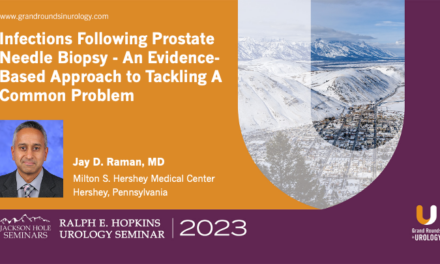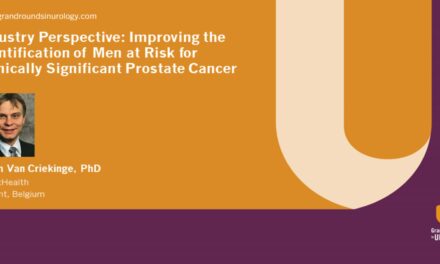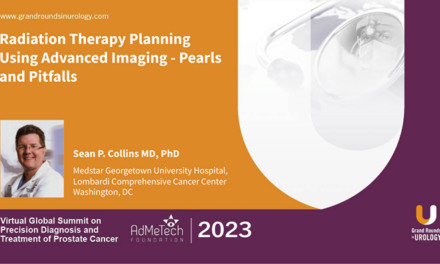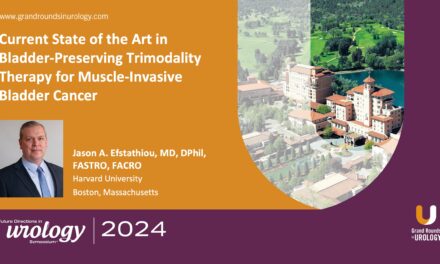Daniel J. George, MD, presented “Phase 3 VISION Study of 177Lu-PSMA-617 in Patients with Metastatic Castration-Resistant Prostate Cancer” during the 31st International Prostate Cancer Update in July 2021 in Snowbird, Utah.
How to cite: George, Daniel J. “Phase 3 VISION Study of 177Lu-PSMA-617 in Patients with Metastatic Castration-Resistant Prostate Cancer.” July 2021. Accessed Nov 2025. https://grandroundsinurology.com/phase-3-vision-study-of-177lu-psma-617-in-patients-with-metastatic-castration-resistant-prostate-cancer/
Phase 3 VISION Study of 177Lu-PSMA-617 in Patients with Metastatic Castration-Resistant Prostate Cancer
Daniel J. George, MD, Professor of Oncologic and Urologic Medicine and Surgery at Duke University, reviews the results of the VISION phase 3 study of 177Lu-PSMA-617 in patients with metastatic castration-resistant prostate cancer. He begins by describing 177Lu-PSMA-617, explaining how it binds to PSMA and causes DNA damage and cell death in cancer. Dr. George then introduces the VISION study, discussing its two arms (standard-of-care, or SOC, and 177Lu-PSMA-617 based treatment vs. SOC alone), as well as its primary endpoints (radiographic progression-free survival, or rPFS, and overall survival). He also highlights the impact of an early dropout rate of 56% in the SOC arm which required enhanced study site education and communication to overcome and resulted in 2 study populations. Dr. George then summarizes the baseline characteristics of the patient populations before detailing the results. He states that 177Lu-PSMA-617 improved rPFS in OS, as shown by the SOC plus 177Lu-PSMA-617-based treatment arm having a higher median survival of 3-5 months. Dr. George then notes that 177Lu-PSMA-617 plus SOC had a 42% partial response rate, a 9.2% complete response rate, and an overall response rate of 50%, whereas SOC alone had a 3% partial response rate and no complete response rate. He states that 177Lu-PSMA-617 with SOC also created a 50% or greater decline in PSA in 46% of patients compared to SOC alone doing the same in only 7.1%. Dr. George discloses that fatigue, bone marrow suppression, dry mouth, nausea and vomiting, renal effects, second primary malignancies, and intracranial hemorrhage are all side effects of this treatment. He concludes that in a heavily pretreated and PSMA-enriched population 177Lu-PSMA-617 demonstrated clinically and statistically significant improvement in OS, rPFS, PSA, and objective responses.
About The 31st Annual International Prostate Cancer Update:
The International Prostate Cancer Update (IPCU), founded in 1990, is a multi-day CME conference focused on prostate cancer treatment updates with expert, international faculty. It is led by expert physicians and is designed for urologists, medical oncologists, radiation oncologists, and other healthcare professionals involved in the diagnosis and treatment of prostate cancer. Dr. George delivered this educational activity during the 31st iteration of the meeting in July 2021 in Snowbird, Utah.
ABOUT THE AUTHOR
Daniel J. George, MD, FASCO, is the Director of Genitourinary Oncology for the Duke University Cancer Institute in Durham, North Carolina. Dr. George also serves as the Eleanor Easley Distinguished Professor of Medicine and Surgery in the Divisions of Medical Oncology and Urology at Duke University. His areas of research include new drug development and biomarkers of GU cancers with an emphasis on health disparities. Dr. George specializes in cancers of the prostate, kidney, bladder, and testis. He has a particular interest in emerging therapies as well as diagnostic tests and markers of cancer biology, and immuno-oncology agents and targeted therapies.





